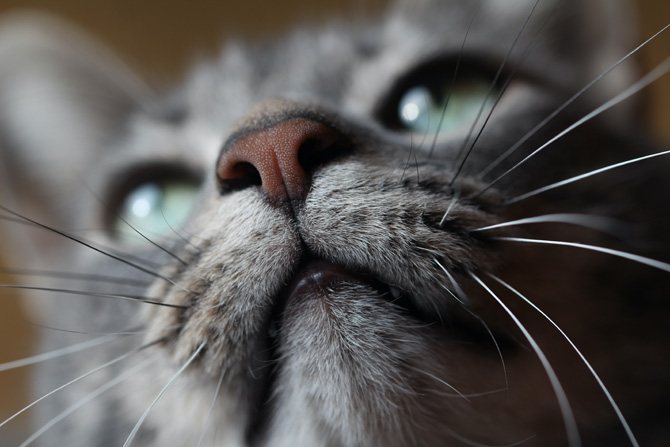Just like humans, as cats age their health and behaviour may change. As a loving cat parent, it’s important to look out for these changes and do all you can to support the health and wellbeing of your ageing cat.
Thankfully, cats now live a lot longer than they used to. According to International Cat Care, our feline friends are considered to be elderly once they reach the ripe old age of 11.
To help you understand your senior cat and his or her needs, it can be useful to know that a 16-year-old cat is equivalent to an 80-year-old human. Heck, it’s no wonder your cat’s not as energetic as he or she used to be!
Understanding the needs of an ageing cat
If you’re lucky enough to have had your cat from a kitten, it’s likely that you’ll recognise differences in its behaviour and daily habits. However, it can also be useful to clue up on common illnesses affecting older cats. This way you can watch out for the common signs and symptoms, or at least spot them early on so that you can seek timely treatment.
Greencross Vets reports that the most common diseases found in ageing cats include kidney disease, diabetes, arthritis and thyroid disease. Here are the common symptoms of each disease state.
Kidney disease
- Lethargy
- Unexplained loss of weight
- Coat looks unkempt
- Drinking more water
- Urinating larger volumes
Diabetes
- Appetite changes
- Weight changes (For example, weight loss despite an increased appetite)
- Lethargy
- Cloudy eyes (cataracts or loss of eyesight)
- Recurring infections, such as urinary or skin infections
- Sweet breath
Arthritis
- Reduced mobility, such as a reluctance to jump, difficulty using the litter tray or showing signs of stiffness
- Changes in activity, such as sleeping more or loss of interest in going outdoors
- Change in grooming habits. May groom less often or you may notice your cat looks unkempt
- Behaviour alterations. May seem withdrawn or show signs of irritability when touched.
Thyroid disease
- Weight loss
- Reduced appetite
- Increased thirst and urination
- Vomiting
- Diarrhoea
- Hyperactivity
- Cat may look unkempt
4 tips for caring for an ageing cat
Aside from informing yourself about common illnesses affecting older cats, there are also some actions you can take to support your senior cat.
1. Monitor your cat’s routine and behaviour
Keeping a check on your feline friend’s daily habits and general wellbeing will help you spot any telltale signs of illness. However, it can also help you to identify your kitty’s changing needs. For example, if you notice it has difficulty with movement, you might consider changing where your cat sleeps or cutting the sides of his or her litter tray o make it easier to use.
2. Be considerate
In the same way that older humans may need to make changes to their home environment to make it easier for themselves, you may need to make some alterations for your cat.
For instance, if your cat has dementia you can increase the number of litter trays around the home to assist your cat in eliminating in an appropriate place. You can also be mindful about maintaining a consistent schedule and try not to re-arrange your furniture.
Other changes might include creating a warmer sleeping area for your meowing mate or providing softer bedding. Cats with arthritis can benefit from having their food and water bowls raised off the floor.
Likewise, you might need to start grooming your cat more often if he or she finds it difficult to groom themselves. Sometimes, even the smallest changes can make a big difference to your cat’s quality of life.
3. Nutritional know-how
Ensuring your cat is eating a well balanced, nutrient-rich diet is important at all stages of its life, but particularly as he or she ages. Talk to your vet about your cat’s individual nutritional needs.
Ageing cats also require increased water, so perhaps you might place extra water bowls around the house. Additionally, older cats can benefit from eating smaller meals more often.
4. Book regular vet checks
Scheduling regular routine health checks with your local vet is important for senior cats. This can help ensure the wellbeing of your fur pal and identify and potential health issues early on.
While ageing cats are more susceptible to illness, they can still live a happy life. Keeping a close eye on your feline friend and making a few simple changes to their daily routine can make a big difference to their quality of life and enjoyment.
Information sources:
Chronic Kidney Disease. Cornell Feline Health Centre. Cornell University College of Medicine. Accessed online July 2021 via: https://www.vet.cornell.edu/departments-centers-and-institutes/cornell-feline-health-center/health-information/feline-health-topics/chronic-kidney-disease
Arthritis in cats and dogs. Pet Professional. Accessed online July 2020 via: https://www.petprofessional.com.au/info-centre/arthritis-in-cats-and-dogs/
Hyperthyroidism in Cats. Cornell Feline Health Centre. Cornell University College of Medicine. Accessed online July 2021 via: https://www.vet.cornell.edu/departments-centers-and-institutes/cornell-feline-health-center/health-information/feline-health-topics/hyperthyroidism-cats
Photo by Kevin Knezic on Unsplash







Leave A Comment